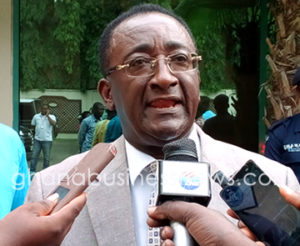Ghana poised to become self-sufficient in poultry production
 Dr Afriyie Akoto, the Minister of Food and Agriculture, has said Ghana is on its way to becoming self-sufficient in poultry production in three years’ time as government provides incentives to local farmers to expand production.
Dr Afriyie Akoto, the Minister of Food and Agriculture, has said Ghana is on its way to becoming self-sufficient in poultry production in three years’ time as government provides incentives to local farmers to expand production.
He said the Government has provided poultry farmers with the needed incentives to help them expand their production and become competitive in the industry.
Dr Akoto said this when he was contributing to the 2020 Budget debate and the approval of the Financial Policy of the Government for the year ending 2020.
Finance Minister Ken Ofori-Atta on November 13, 2019, presented the 2020 Budget Statement and Economic Policy of government to Parliament where he outlined a number of programmes and policies aiming to drive the national economy.
Dr Akoto described the results from the Government’s flagship programme – Planning for Food and Jobs, as having been tremendous.
The strategy was to focus on smallholder famers who produced over 90 percent of agricultural output in the country, he said: “Give them fertilizers and improved seeds so that they can increase their productivity”.
Last year, he said, Ghana was able to export 130,000 metric tons of 19 food items to its neighbours such as Niger, Nigeria, Togo, Burkina Faso and Cote d’Ivoire.
Dr Akoto also announced that the government had raised and distributed 29 million seedlings of six tree crops; cashew, palm-oil, mango, coconut, coffee and cocoa to farmers.
He said distribution of seedlings to farmers was for the country to diversify from cocoa production and to other cash crops to help raise more revenue for the country.
He said the northern sector would for the first time have cashew as its own tree crop.
He added that government would bring in machinery for agro-processing that would help farmers add value to their produce, increase incomes and create jobs.
The government is also targeting to move the growth in agriculture from the current 6.7 percent to a double digit.
Mr Eric Opoku, Ranking Member on Food, Agriculture and Cocoa Affairs, described the projected growth rate of 6.7 percent in the agriculture sector as unrealistic since the first half of the year saw only 2.4 percent growth.
He argued that while government was increasing investments in the agriculture sector of the economy, the growth rate in the sector kept declining.
“Mr Speaker, the paradox of the situation is that when we are increasing investments in the sector growth rate is declining…so we decide to interrogate the issues critically to understand what is going on,” he added.
He disputed claims that government distributed 331,000 tons of subsidized fertilizer out of a projected 342,200 tons for 2019, claiming it actually distributed 294,292 tons.
He said the government claimed in its 2018 and 2019 budgets that it recruited 201,000 and 577,000 farmers respectively for the Planting for Food and Jobs programme.
He noted that in the 2020 budget, government stated it had recruited 880,000 instead of 778,000, and accused the Minister of adding 102,000 farmers to the scheme who never participated in the programme.
“These are ghost farmers …where are you getting the figures from,” he quizzed.
Source: GNA
